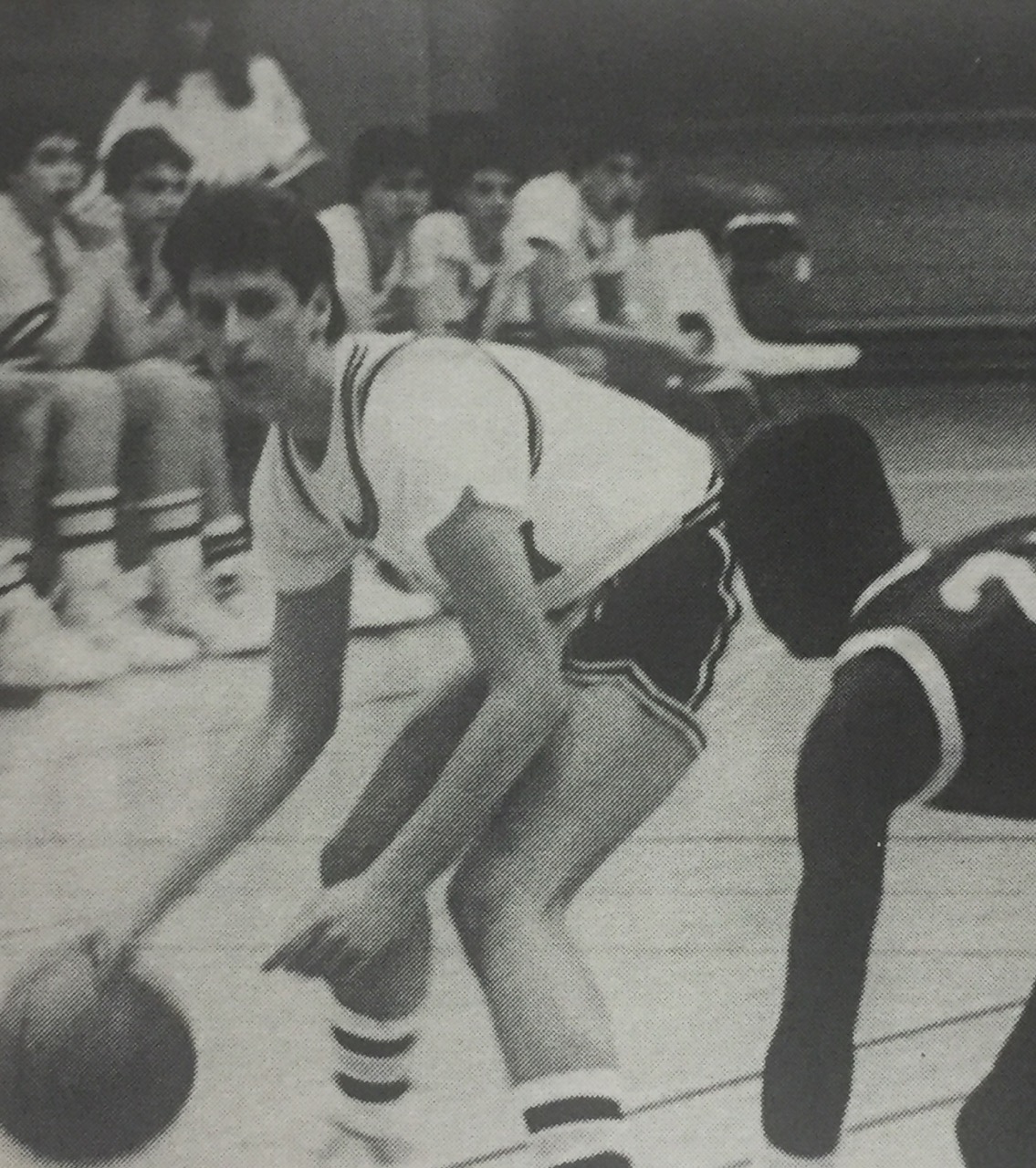“Telling the Story” With Eric Ritigstein
 In our youth, we go along day to day trying to keep up with all the new experiences and challenges coming our way, fitting them into an emergent self that is still groping to form an identity. Somewhere in our third or fourth decade (in some cases, later), we begin to notice patterns, arcs, narratives, larger stories behind the stories of daily life, that give us a clearer sense of who we are and how we became that person.
In our youth, we go along day to day trying to keep up with all the new experiences and challenges coming our way, fitting them into an emergent self that is still groping to form an identity. Somewhere in our third or fourth decade (in some cases, later), we begin to notice patterns, arcs, narratives, larger stories behind the stories of daily life, that give us a clearer sense of who we are and how we became that person.
At age 48, Boxer & Gerson Personal Injury Attorney Eric Ritigstein is in a sweet spot in his own life. Middle-aged, mid-career, long married and with a teen son, his best, most productive days are—barring some metaphorical bolt of lightning derailing his plans—clearly still ahead of him. And don’t think for a second he doesn’t appreciate it.
“I’m incredibly lucky to be doing what I do,” he says, perhaps giving too short shrift to the role his own intelligence, tenacity and communication skills have played in getting him where he is.
Ritigstein is one of two personal injury specialists at Boxer & Gerson, forming a duo with longtime partner Gary Roth. He joined the firm in January 2014, having spent the previous seven years working as a defense attorney for a firm that got most of its cases from insurance companies.
He doesn’t regret those years; they provided him with a living to help support his family and a great deal of legal experience he puts to use every day. But neither can he fathom, by any stretch of his imagination, hopping back across to the defense side of the table.
The law immediately felt like a good fit, given my writing and storytelling background, and it has turned out to be exactly that. When I’m presenting a case, it’s all about telling the story of my client. Screenwriting was great training for that.
“It’s all about the clients,” he explains. “Yes, as a defense attorney I might have been defending a decent person or organization in a lawsuit, but I never truly got to know the defendant. The real client in insurance defense, the one who is paying the attorney fees, is the insurance company. It controls most everything about the case. As a defense attorney, I always did my best to represent the defendant, but I had very little say in how the case ultimately resolved. A few years into doing defense work, I knew I wanted to be on the plaintiff side.”
As it happened, Ritigstein had a kindly boss who understood his charge’s frustrations and sought to find a happy medium that might help retain him. (Smart boss.) So he and Ritigstein worked out an arrangement that let Ritigstein take on select plaintiff clients, provided the defendant wasn’t represented by one of the insurance companies that gave his firm business.
Fair enough.
The arrangement lasted all of two cases, during which Ritigstein became so impassioned with the work that he knew a mere occasional plaintiff client wouldn’t cut it.
Cue up a job search, the information that Boxer & Gerson’s veteran personal injury attorney John Anton was in the process of winding down his career, and that the firm was open to someone new coming on board. Ritigstein was brought in to meet initially with Roth, and then he made the rounds with multiple other firm partners.
The job offer followed, and he has never looked back to that moment without profound gratitude, giving rise to the following: “I am here for the rest of my career, or as long as they’ll have me.”
***

Starting point guard, Commack North High School, Long Island, 1988
Ritigstein is the Brooklyn-born first son of a psychologist father and social worker mother, with a brother (also a lawyer) four years his junior. The family left Brooklyn for Long Island when Ritigstein was 2 1/2, and his world turned into one of almost non-stop sports activity.
Basketball, football, little league, soccer, tennis—he did it all, almost all the time, back when kids could wander all day with a promise simply to show up for dinner—before heading out again.
Still, it was basketball that struck most deeply. Ritigstein went on to be captain and starting point guard on his high school team, owner, he admits, of “a good outside shot.” That shot was largely a product of thousands of hours of shooting in the driveway, something he relished doing alone, accompanied by a boom box set atop an overturned bucket and set permanently to 102.3 WBAB, Long Island’s classic rock station.
Those were hours not spent, of course, poring over school textbooks, a swap that Ritigstein was perfectly happy to make at the time, given he was a good student aiming for college but not necessarily aspiring to be class valedictorian. Academic striving could come later.
For a while, he thought he might answer a call to medicine, but after a volunteer stint in a pediatric emergency room, he realized doctoring was not for him.
So at age 25, Ritigstein packed up a few bags and moved to Los Angeles to try his hand at screenwriting. Even today, he worries that may sound flakey to those who think that serious attorneys should know from kindergarten that they are destined to command a courtroom, then spend countless hours poring over journals in the law library looking for the secret to get their case over the goal line. But that is to ignore just how serious and full of struggle and commitment and creativity and rejection and resilience Hollywood screenwriting is, and how intensely it cultivates the arts of storytelling, pleading one’s case, negotiation, relentless effort, and on-the-fly adjustments.
All the things, in other words, that make for a great attorney.
Ritigstein gave Hollywood nearly seven years, working in behind-the-scenes positions for Castle Rock Entertainment and HBO Films to pay the bills while writing dozens of television and movie scripts that never found their way to production.
He almost broke through with an original movie script that became a finalist in the Austin Film Festival screenwriting competition and was named to the Top 100 in Disney’s annual competition. The script, chronicling a young girl’s conflict between keeping her horse as a pet or allowing it to enter the world of horse racing, was optioned to a production company, but in the way of such things, never made it to the big screen.
At that point, Ritigstein had been married for a couple of years to an ex-dancer turned entertainment lawyer whom he had met at a mutual friend’s party. When they first met and Ritigstein asked for her phone number, he had pen but no paper, so he wrote it on a dollar bill from his wallet and called her shortly thereafter. “I still have the dollar bill,” he confides, “but the phone number is crossed out. If things didn’t work out, I didn’t want Andrea’s number floating around Los Angeles.”
As it happened, Andrea disliked the law as much as he later came to love it, so when Ritigstein took stock of his screenwriting career that still held promise but had yet to bring him the success he was looking for, he made another bold decision: to abandon his previous decision to move to Hollywood and instead apply to law school at age 32.

A Jonas birthday celebration
With his parents still on the east coast and his wife’s in northern California, Ritigstein focused his efforts on the northern law schools and chose the highly regarded McGeorge School of Law at the University of the Pacific in Sacramento. Son Jonas was born in Ritigstein’s second year there, so when his wife temporarily stopped working her attorney job to devote herself to childcare (she later transitioned more happily to sales consulting), “We were basically living on my student loans,” he says.
“I looked at law school as my full-time job. And being an older student with a child, that was no problem for me. Law immediately felt like a good fit, given my writing and storytelling background, and it has turned out to be exactly that. When I’m presenting a case, it’s all about telling the story of my client. Screenwriting was great training for that.”
Another great feature of plaintiff work he relishes: no worrying about billable hours. “We work strictly on contingency, so my clients and I win or lose together,” he says. “I pick them and they pick me; it’s mutual. We have to trust each other. That’s critical.”
With 30-35 cases in Ritigstein’s pipeline at any given time, that adds up to a lot of free-flowing trust and a full schedule, a fact that leaves him exultant with where his career has landed him.
“I’m never sitting around here waiting for the phone to ring,” he relates. “I’m busy, and I truly love every day that I’m here.”
Meanwhile, the now 14-year-old Jonas has aged out of the CYO basketball leagues in which Ritigstein used to serve as a coach for his teams and has settled, father says with a laugh, “on the one sport—rugby—that I never played.”
His son remains a basketball fan, though, and the whole family follows the Warriors closely. In one splurge a year, given the astronomical ticket prices, Ritigstein snags some near-courtside seats late on the day of a game, when prices begin to fall at least a little, for a father-son outing.
And just to further exercise the basketball jones that has never seemed to leave Ritigstein’s system, he has a standing game with a group of other middle-aged dads, most of whose kids went to elementary school together, for pickup basketball at a park in Danville at 7 a.m. on Saturdays, when the rest of the world is sleeping in.
“Our kids are all into sports. That means Saturdays are generally spent at the ball fields,” Ritigstein says. “So we have to get our own game in early. There’s no way I’m ready to let go of basketball yet.”
***




